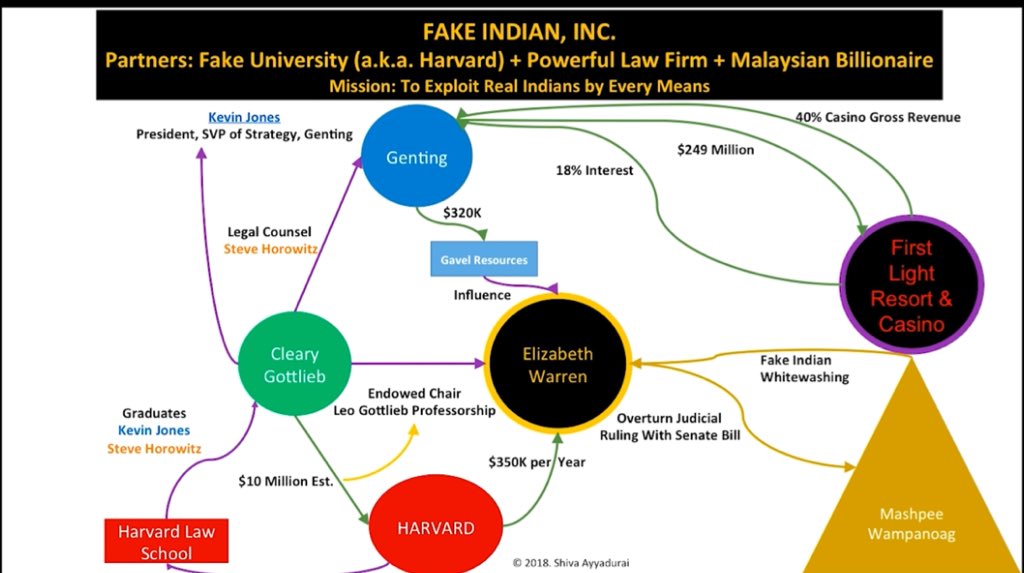
CHECK OUT REEL WAMPS
The Tribe purchased land owned by investors in Middleboro.
Will that be included as another casino?
Is the Tribe paying taxes on that land?
Mashpee Wampanoag Tribe to vote on dwindling budget
By Tanner SteningPosted May 18, 2018
MASHPEE — The Mashpee Wampanoag Tribe is facing a future with far fewer financial resources, at least temporarily, as it continues to fight to secure its reservation land and build a $1 billion casino, according to its proposed budget for fiscal year 2018.
The tribal council approved a budget on May 3 that includes a steep decline in loan dollars from Genting Malaysia — the development firm backing the tribe’s effort to build a casino in Taunton — deep cuts to tribal salaries, and sizeable rollbacks in most spending categories across all departments, according to a copy of the proposed budget obtained by the Times.
The document was distributed to tribe members earlier this week and the general membership is scheduled to vote on it Sunday, according to the tribe’s website and a source familiar with the tribe’s finances.
For the coming fiscal year, the tribe is receiving $5.4 million in loans from Genting, which is less than half of what it received for fiscal year 2017. That year, the tribe received $11,944,567, an increase of approximately $250,000 over fiscal year 2016.
According to Genting’s most recently quarterly report, the Malaysian-based casino group has invested roughly $388.3 million in promissory notes issued by the tribe, which carry fixed interest rates of 12 percent and 18 percent per year. In November, a robocall announcing a meeting for tribe members to address longstanding concerns about the tribe’s mounting debt claimed its debt had grown to $425 million and that services had been cut.
Neighbors of the proposed Taunton casino had sued the Interior Department in February 2016 seeking to overturn the agency’s decision to take land into trust. U.S District Court Judge William Young remanded that decision back to the federal agency, suggesting in a later ruling that an alternative approach might allow the Interior Department to take the land into trust. Since then, the agency has been considering whether the state of Massachusetts had exercised authority over the Mashpee Wampanoag Tribe in a manner that could be viewed as a surrogate for the federal jurisdiction requirement under the Indian Reorganization Act.
Genting’s ability to recover its investment is “dependent on the outcome of the pending legal case and review by the relevant government authority,” according to the report.
There are significant cutbacks proposed to tribal employment. Tribal leaders will spend only $4,433,385 on salaries this year, down from $7,226,643 in fiscal year 2017. In 2016, the tribe spent $8,397,569 on salaries. As a result of that reduction, the tribe has had to lay off 31 members, according to a source with knowledge of the reductions, including both of its grant writers. The tribe employed roughly 100 members before the cutbacks, the source said.
The employees who were laid off received letters in December and January, informing them that “recent changes to the tribe’s funding source and litigation around potential gaming enterprise” were responsible for the layoffs.
Tribal council salaries will see an 11.5 percent reduction, with payouts for the 12 legislative personnel — including fringe benefits — totaling $938,206. That figure is down from roughly $1,060,468 in 2017.
But despite spending cutbacks, tribal leaders still enjoy a sizeable piece of overall spending on tribal salaries; their share of salaries across all departments has increased from 14.7 percent in 2017 to 21.2 percent, despite reductions in their annual pay.
Tribal Chairman Cedric Cromwell’s proposed salary, including fringe benefits, for the coming fiscal year is $181,794, down from $219,186 in 2017. Tribal Vice Chairwoman Jessie “Little Doe” Baird will be making $134,439, down from $160,269.
There are two council members who make considerably less than the other members. Rod Dias’ proposed salary for the coming fiscal year is listed at $1,200 and Carlton Hendricks’ salary is $11,800; under the proposed spending plan other council members would make between $84,255 and $103,566, fringe benefits included.
Critics within the tribe have repeatedly raised questions about the rising debt associated with planning and building the casino, and have criticized tribal leaders for taking home what they believe to be excessive paychecks.
After tribal land had been taken into trust in 2015, Cromwell saw his salary increase 42 percent from $125,453 to $178,200 in the span of three weeks. That spike was tied to a vote that sought to bring tribal council members in line with officers in other tribes and municipal governments.
In a statement emailed to the Times, Cromwell said the budget and its financing go through an exhaustive review and approval process through general membership votes and tribal council approvals.
“Tribal citizens then vote on the budget,” he said. “This year we are exploring ways to become more efficient in our operations and we are making some adjustments.”
Spending on legal fees and professional services has taken the greatest hit in the proposed budget. The tribe has allocated only $500,000 for legal spending in the coming fiscal year, which is down from $1,193,795; and spending to professional services will plummet from $3,989,495 in 2017 to $518,000, according to the proposed budget provided to the Times.
The decline in legal fees and lobbying efforts may be tied to a bill that was introduced in March that would end the ongoing legal challenge to the tribe’s efforts to secure its reservation land, consisting of 171 acres in Mashpee and 150 acres in Taunton where the tribe’s casino would be built.
Tribe concerned about proposed changes to bill
May 18, 2018



